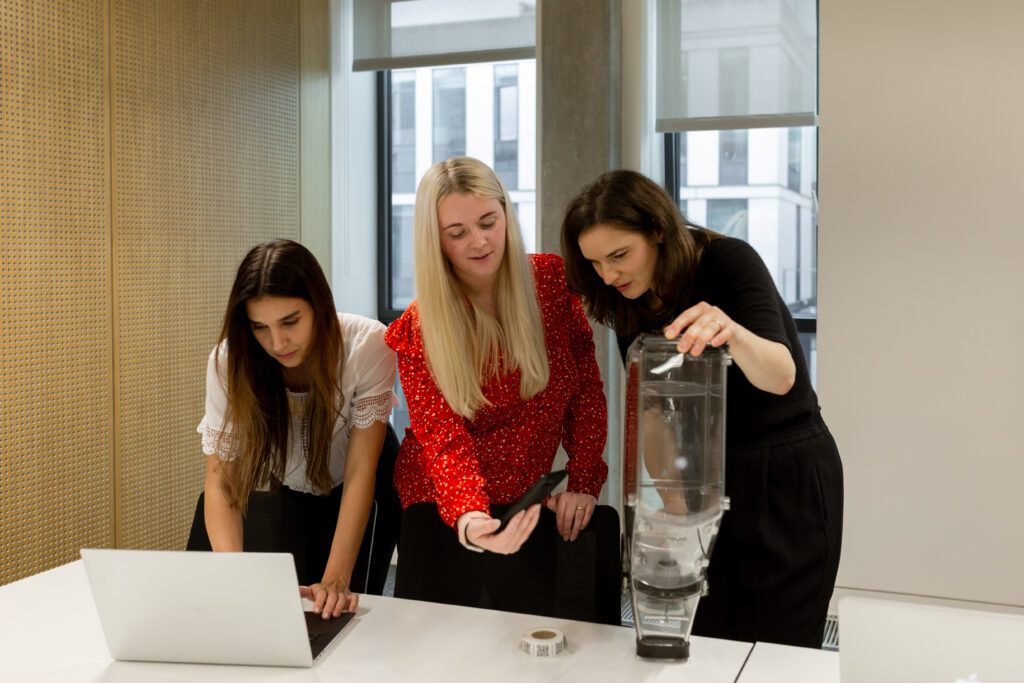- About UKCPN
- Focus areas
-
-
Featured challenge
-
Other focus areas
-
-
-
- Funding & opportunities
- News & insights
- Events
- Impact

“The challenge of companies redesigning their systems, to enable greater reuse, is a formidable one. It comes with risks attached. But with the support of the Smart Sustainable Plastic Packaging challenge, we’ve been able to take away some of those risks for companies that want to reuse more.”
This Edinburgh-based start-up has developed a new digital passport platform that makes it easier for packaging to be reused.
Under pressure from customers, and wanting to operate in a more sustainable way, many high-profile firms have now signed-up to the UK Plastics Pact and similar agreements, committing themselves to increasing significantly the amount of packaging that they reuse. But with only 1.6% of packaging currently reusable, there’s a mountain to climb.
A major obstacle in the way of reuse has been the difficulty of knowing what a given piece of packaging has come into contact with (in case it includes allergens, for example). Legally, businesses need to have this information if they are to use a piece of packaging again.
Supported by the Smart Sustainable Plastic Packagingchallenge (SSPP), Edinburgh-based start-up Reath is helping to overcome this hurdle. Reath specialises in using digital passports to support the circular economy, aiming to bring about systemic change in the way that packaging is reused.
Reath’s SSPP-funded project involved identifying and standardising the data that needs to be collected, for packaging to be reusable. Reath (the name is a pun on the Scots word ‘eath’ meaning ‘easy’) began by asking hundreds of companies what was preventing them from reusing their packaging. Among the most important reasons was the lack of robust, reliable tracking systems to help keep tabs on each piece of packaging.
The digital platform that Reath has developed makes it possible to track the lifecycle of reusable packaging. Reuse. ID, which Reath has released as an Open Data Standard, creates a standardised ‘digital passport’ for each item: it is tagged and given a unique ID, and Reath’s software then tracks it at every stage of its lifecycle. The tags that are used can vary. As Reath co-founder Emily Rogers explained:
“We’re agnostic about the tags. QR codes, barcodes, digital watermarks, RFID… they can all be used to trace a piece of packaging, and different tags will be right for different pieces of packaging and products. With the tags, we collect biometric data for each item.”
The data that is collected includes ‘static’ information that doesn’t change – such as when a piece of packaging was made, what it was made from and what percentage of recycled material went into it – to the ‘dynamic’, such as what it’s been filled with and how many times it’s been reused.
With the Plastics Packaging Tax in the UK coming into force in April 2022, and similar penalties being introduced around the world, the encouragement is there for companies to reuse more. And by releasing reuse.ID as an Open Data Standard, Reath has given them a way of doing so in a safe and standardised way, helping them to stay compliant with important health and safety and waste legislation.
Reath is now involved with many different companies, helping them to navigate the tricky business of rolling-out reuse systems. Though reuse.ID is freely available as a standard, many firms choose to buy Reath’s proprietary software product that incorporates reuse. ID, rather than developing their own. The dynamic information that they then collect can be used in a variety of ways: it can be sent to inventory managers to monitor stock levels of reused packaging, for example. Reath’s aim ultimately is for the data that it collates through reuse.ID to influence the design of future packaging, to make it better suited to reuse; showing, for example, what kinds of material hold up well with repeated filling.
For fellow co-founder Claire Rampen,
“The challenge of companies redesigning their systems, to enable greater reuse, is a formidable one. It comes with risks attached. But with the support of the Smart Sustainable Plastic Packaging challenge, we’ve been able to take away some of those risks for companies that want to reuse more.”
The founders of Reath signed up to the KTN-supported UK Circular Plastics Network in February 2020, where they received information about the SSPP competition. The contacts and application advice supplied by Innovate UK KTN were invaluable to Reath – a young company with limited experience of applying for grants and collaborating with the plastics value chain – in getting its project funded by SSPP. Reath has since been active in other KTN activities and has mentored other young businesses.
